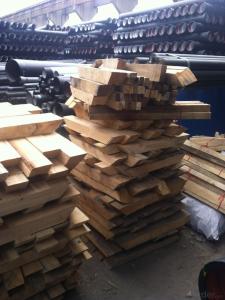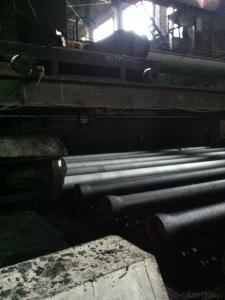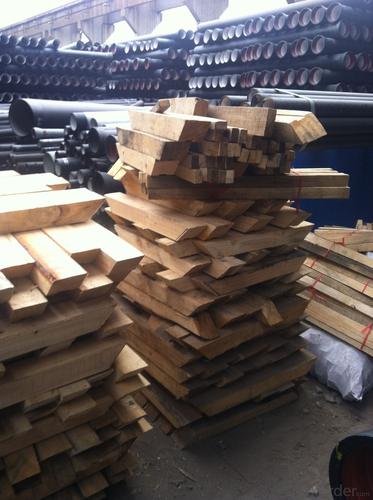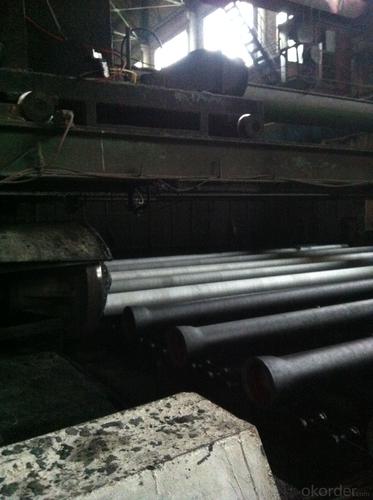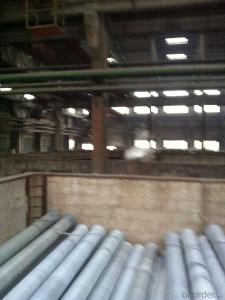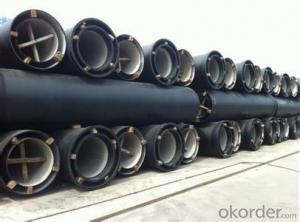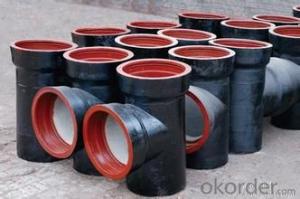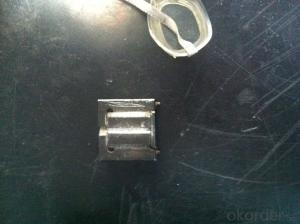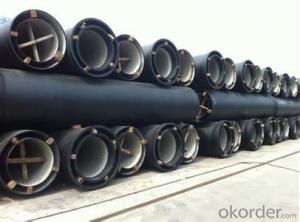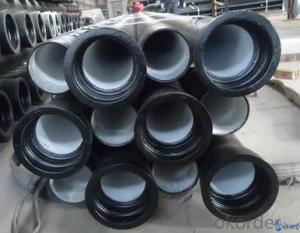DUCTILE IRON PIPEs K9 CLASS DN100
- Loading Port:
- Tianjin
- Payment Terms:
- TT OR LC
- Min Order Qty:
- 20 pc
- Supply Capability:
- 3000 pc/month
OKorder Service Pledge
OKorder Financial Service
You Might Also Like
Specifications
Subsidiary of Forbes Fortune 500 company (Ranking 485th in 2011). Provides full rang of ductile iron pipes with finest quality.
Company Profile
CNBM International Corporation belongs to China National Building Material Group Corporation (CNBM Group), ranking 365th in Forbes world Fortune 500 companies of 2012, and one of the largest state-owned companies in China since 1984. CNBM International was founded to provide sales support to international customers for the CNBM family of plants.
CNBM DIP Division is specialized in manufacturing high quality ductile iron potable / sewage water pipeline products in China. Ductile iron and cast iron pipe, fittings, valves, hydrants and drainage products are our main products, and orders are now shipped all over the world.
Our aim is to become an world-class influential supplier and professional service provider in world water industry.
- Q: Can ductile iron pipes be used for underground steam distribution systems?
- Yes, ductile iron pipes can be used for underground steam distribution systems. Ductile iron has excellent strength, durability, and resistance to high temperatures, making it suitable for carrying steam underground. Additionally, its corrosion resistance properties ensure a longer lifespan and reduced maintenance costs.
- Q: It's not easy to drill ductile iron with cobalt high speed steel bit. Please help to point it out
- Determine the authentic M35 cobalt bit, which is about 65HRC in hardness. General workpiece hardness of about 45HRC or less of the problem.
- Q: How does ductile iron pipe perform in areas with high soil acidity?
- Ductile iron pipe performs well in areas with high soil acidity. Its corrosion-resistant properties and protective coatings make it highly resistant to the corrosive effects of acidic soil.
- Q: How are ductile iron pipes protected against internal scaling or buildup?
- Ductile iron pipes are protected against internal scaling or buildup through the use of various coatings and linings. One commonly used method is cement mortar lining, where a layer of cement mortar is applied to the inner surface of the pipe to prevent scaling and corrosion. Additionally, epoxy coatings are also utilized, which provide a smooth and protective layer that inhibits the formation of scale and buildup. These protective measures help to ensure the longevity and efficiency of ductile iron pipes in various applications.
- Q: What is the expected external coating for ductile iron pipes?
- The expected external coating for ductile iron pipes is typically a protective layer of asphaltic or polyethylene coating.
- Q: Are ductile iron pipes recyclable?
- Indeed, it is true that ductile iron pipes possess recyclability. Ductile iron, which belongs to the cast iron family, showcases exceptional sturdiness and endurance, rendering it an ideal selection for a wide array of applications, encompassing water and sewage systems. Once these pipes surpass their lifespan, they can undergo recycling and repurposing. The recycling procedure involves the fusion of the ductile iron pipes, employing the molten metal to generate fresh pipes or alternative iron-based commodities. By recycling ductile iron pipes, not only do we contribute to the conservation of natural resources, but we also curtail the volume of waste that inundates landfills. Hence, ductile iron pipes are perceived as a sustainable and eco-friendly alternative for piping systems.
- Q: Are ductile iron pipes resistant to chemicals?
- Generally, ductile iron pipes exhibit resistance to chemicals. Ductile iron, a variety of cast iron, is fortified with small amounts of magnesium to enhance its strength and ductility. This alloying process effectively heightens its ability to withstand corrosion and chemical attack. Ductile iron pipes have found extensive use in multiple applications, such as water supply, wastewater treatment, and industrial piping systems, where they may encounter a range of chemicals. Nevertheless, it is crucial to acknowledge that the resistance of ductile iron pipes to chemicals can vary based on the specific type and concentration of the chemical in question. Thus, it is advisable to seek guidance from the manufacturer or a qualified engineer to ascertain the suitability of ductile iron pipes for a particular chemical application.
- Q: DN1800 can the length of ductile iron pipes be several meters? What is the total weight?
- Ductile cast iron pipe after annealing, the microstructure is ferrite and pearlite, good mechanical properties, excellent corrosion resistance, good ductility, good sealing effect, simple installation, mainly for municipal, industrial and mining enterprises, water supply, gas, oil etc..
- Q: A tube is used only in ductile iron pipes, isn't it?
- Ductile weakness: ductile cast iron pipes connected by human factors such as the operation level of responsibility, influence, construction not convenient. The advantages of PE PE PE pipe has good corrosion resistance and its anti inorganic performance than that of the metal pipe is much stronger in the buried without corrosion, construction convenient. Small diameter PE pipe in the price performance ratio is better than that of steel and ductile iron.PE tube have disadvantages: benzene, gasoline, carbon tetrachloride and other organic solvents have certain effect on pe. If the organic solvent is infiltrated into the polyethylene, the swelling will occur, and its physical properties will be decreased. Its pressure resistance and temperature resistance are poor.
- Q: Which direction should the spigot of the K9 ductile iron pipe be installed?
- Ductile iron pipes mainly called centrifugal ductile iron pipe, it has the properties of nature, iron and steel, excellent corrosion resistance, good ductility, good sealing effect, simple installation, mainly for municipal, industrial and mining enterprises, water supply, gas, oil etc.. Water supply pipe is the first choice, with high cost performance.
Send your message to us
DUCTILE IRON PIPEs K9 CLASS DN100
- Loading Port:
- Tianjin
- Payment Terms:
- TT OR LC
- Min Order Qty:
- 20 pc
- Supply Capability:
- 3000 pc/month
OKorder Service Pledge
OKorder Financial Service
Similar products
Hot products
Hot Searches
Related keywords
